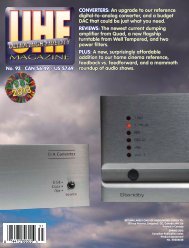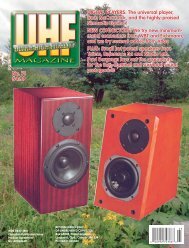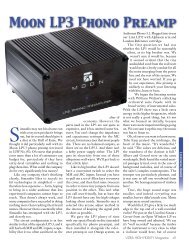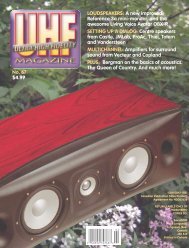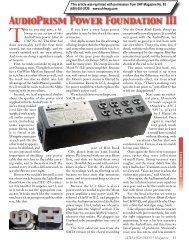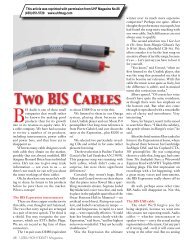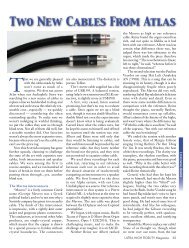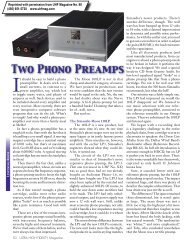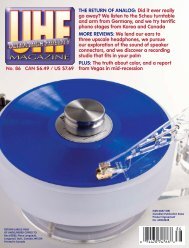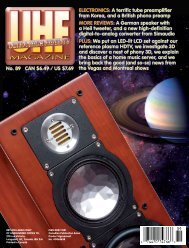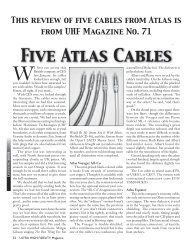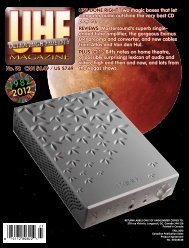ANALOG vs DIGITAL - Ultra High Fidelity Magazine
ANALOG vs DIGITAL - Ultra High Fidelity Magazine
ANALOG vs DIGITAL - Ultra High Fidelity Magazine
You also want an ePaper? Increase the reach of your titles
YUMPU automatically turns print PDFs into web optimized ePapers that Google loves.
Software<br />
Feedback<br />
Freddie Hubbard became in reality<br />
one of the strongest and most magnetic<br />
figures in modern jazz, before his lip<br />
accident in 1992, and Open Sesame is<br />
proof positive of the beginnings of his<br />
greatness.<br />
Seeds We Sow<br />
Lindsey Buckingham<br />
Eagle Records ER202142<br />
Steve Bourke: First there was Lindsey<br />
Buckingham the west coast guitarist and<br />
folk-rock singer (and boyfriend of Stevie<br />
Nicks), then there was Fleetwood Mac<br />
and the fabulous success of Rumours, one<br />
of the all-time great records of modern<br />
rock and roll. Then came the more<br />
mature and experienced artist, the one<br />
we have admired for several years now,<br />
who sings with a tortured passion that<br />
can be almost difficult to experience.<br />
The difficulty lies in how easy it is to<br />
share and empathize with the artist.<br />
He communicates his understanding of<br />
emotion, both kind and sorrowful, in<br />
such a facile way that there is no escape<br />
from a deep reaction, to him and his<br />
music. He sings with dynamic shifts<br />
that perfectly convey the tenderness and<br />
agony that love can bring, to him and to<br />
us all. Buckingham may have mellowed<br />
out over the last few years — after all he<br />
is a happily married father and family<br />
man. Still he calls up his original creative<br />
drive at will.<br />
Has his personal singing and writing<br />
style changed much since his solo career<br />
got under way? His voice sounds better<br />
than ever. It has a burnished tone that<br />
reflects his maturity, and it can cause an<br />
internal wrenching in the musical heart<br />
of his audience, be it a large group or a<br />
72 ULTRA HIGH FIDELITY <strong>Magazine</strong><br />
solo fan listening on the bus to work.<br />
The title song is a message to all,<br />
almost in the same league as Paul<br />
Simon’s lyricism. Though Mr. Buckingham<br />
injects an aging melancholy<br />
into the spaces between the notes of his<br />
compositions that sets his work apart<br />
from everyone else. It is this sincere<br />
emotionalism that marks his music as<br />
worth hearing.<br />
Other observers have called Buckingham<br />
the creative force behind the<br />
Fleetwood Mac band. Certainly his<br />
guitar style is very much his own. No one<br />
else uses rhythmic emphasis in a guitar<br />
solo quite like Buckingham. He does it<br />
just his way, and his way only. Yes, it is<br />
reminiscent of parts of the Fleetwood<br />
Mac repertoire, as it should be. Why<br />
abandon a style that is still vigorous and<br />
immediate? It is a style that holds the<br />
listener, and I suspect still rejuvenates<br />
Buckingham himself. After I had heard<br />
the disc I wasn’t thinking about Fleetwood<br />
Mac. I was still hearing the voice<br />
and the individualism that makes Lindsey<br />
Buckingham an artist who endures.<br />
Rainbow People<br />
Eric Bibb<br />
Opus 3 CD7723<br />
Gerard Rejskind: The American-born<br />
Bluesman Eric Bibb lives part of the<br />
time in Finland, and over the years he<br />
has made a number of recordings for<br />
the seminal Swedish audiophile label<br />
Opus 3. We’ve given highly positive<br />
review to his recent recordings, but he’s<br />
been at this for a long time. How did he<br />
sound at the beginning?<br />
The original was of course on LP,<br />
since it was recorded in 1977. For that<br />
reason also, it’s shorter than more<br />
recent digital discs. Curiously, it has<br />
been released in multichannel format,<br />
though the original was of course in<br />
two-channel stereo. Jan-Eric Persson<br />
has since dropped surround sound, and<br />
is releasing his newer recordings in two<br />
channel. I approve heartily.<br />
This album, like pretty much all the<br />
Opus 3 albums of the era, was a purist<br />
Blumlein stereo job, using an AKG C-24<br />
stereo microphone. Jan-Eric was choosing<br />
the venue where his musicians would<br />
have sounded best to a live listener. He<br />
would then take time — a whole day if<br />
need be — to find exactly the right place<br />
for his microphones…or, in this case, his<br />
microphone. That’s an expensive way of<br />
recording if you have union musicians<br />
with their meters ticking, but the result<br />
is an amazingly coherent recording in<br />
which no detail can escape your attention.<br />
Jan-Eric once treated me to a demo<br />
of one of his Blumlein recordings alongside<br />
a recording of the same musicians<br />
done with the mid-side microphone<br />
method favored by such companies as<br />
Decca. No comparison.<br />
It’s interesting to compare the young<br />
Eric Bibb (he was then just 26) with the<br />
more mature singer we know from the<br />
superb later recordings, Spirit & the<br />
Blues, Good Stuff and Just Like Love. He<br />
didn’t have the confidence he would later<br />
acquire, which is no surprise, but his<br />
talent and potential are already evident.<br />
Lonesome Child Blues is especially excellent.<br />
So is Look Over Yonder, a Gospel<br />
song which presages his work on Spirit<br />
& the Blues. Lead Me, Guide Me is an<br />
astonishing duet with Cyndee Peters.<br />
Peters was also an early Opus 3 artist,<br />
with an album titled Black is the Color,<br />
and I had forgotten how good she was.<br />
On Sunday School, the weakest song on<br />
the album, you can hear that Bibbs’ voice<br />
control on sustained notes was not yet<br />
what it would later become. Still, there’s<br />
a lot to love on this album.<br />
The sound? If you read our last<br />
issue you’ll know that bad tape all but<br />
destroyed the sound archives of a generation.<br />
The master was made on Ampex<br />
tape, too. Clearly it has survived well.<br />
The high-definition on the SACD layer<br />
of this hybrid disc is highly satisfying.<br />
And there’s a vinyl version too!



